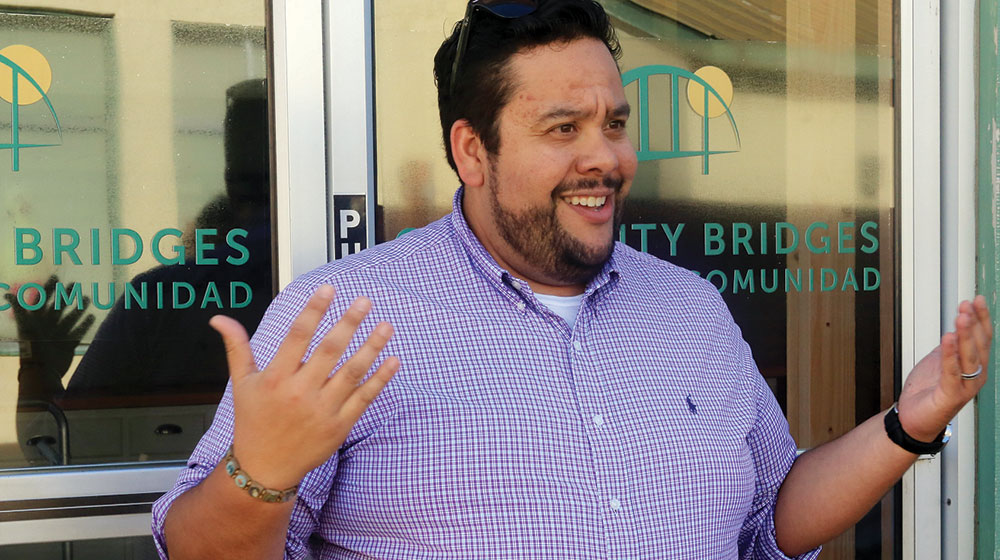Earlier this year, President Donald Trump ordered federal agencies to withhold federal funding from local governments that did not cooperate with his mass deportation agenda.
The governments, along with a host of advocacy groups, challenged the executive orders, arguing that Trump lacks constitutional authority to impose such sweeping conditions.
In April, U.S. District Judge William Orrick in San Francisco agreed, and issued a preliminary injunction blocking the orders, saying that the threat to strip billions in funding was an unconstitutional “coercive threat.”
Community Bridges has now joined six other California nonprofits in filing an amicus brief urging the U.S. Court of Appeals for the Ninth Circuit to block the Trump Administration’s efforts.
The amicus brief, filed by the Asian Law Caucus and Cooley LLP, highlights the impact that the administration’s executive orders could have on nonprofits’ ability to provide vital services.
Community Bridges joins the brief with San Francisco Interfaith Council, San Francisco Immigrant Legal & Education Network, Silicon Valley Council of Nonprofits, California Association of Nonprofits, California Behavioral Health Association and the Behavioral Health Contractors’ Association.
These represent hundreds of nonprofits that serve millions of Californians each year, said Community Bridges spokesman Tony Nuñez.
CEO Raymon Cancino said that since its inception in 1977, Community Bridges has “stood with those who seek justice, fairness, and dignity for all people.”
“This attempt to weaponize federal funds against our communities is a direct assault on local self-determination and the people we serve,” Cancino said. “We join this fight because our work cannot be dictated by fear or partisan retaliation. These dollars belong to the people; they must be invested in the well-being of our communities, not withheld as punishment for upholding America’s promise of liberty and refuge.”
The brief details how the funding uncertainty wrought by Trump’s threats forces nonprofits to weigh service cuts just as communities need them most, Nuñez said.
In addition, programs such as food assistance, senior nutrition, disability services, childcare and health clinics are imperiled.
Worse, immigrant families worried about federal immigration enforcement are reluctant to seek help; they may delay medical care, forgo nutrition assistance and even decline to report crimes, Nuñez said.
This threatens the health and safety of immigrant households and undermines community trust and public safety, he said.
Trump signed two executive orders on Jan. 20 and Feb. 19, directing federal agencies to withhold funding from sanctuary jurisdictions.
Orrick’s injunction was later expanded to include major metropolitan areas across the country, including Boston, Chicago, Denver, Los Angeles, San Francisco, Portland and Seattle.
The Trump administration has since appealed the decision to the Ninth Circuit Court of Appeals.
Community Bridges and its nonprofit allies have now filed an amicus curiae brief—which translates to a “friend of the court” filing—supporting the injunction.
Amicus briefs are submitted by organizations not directly involved in a lawsuit, but who can bring perspectives to help the court weigh the broader impact of its ruling.
The brief emphasizes how withholding funds undermines nonprofits’ ability to deliver critical services, deters immigrant families from seeking help, and threatens the overall health and safety of entire communities.
“Community Bridges has always believed that everyone deserves access to care, support, and opportunity, regardless of where they come from or what language they speak,” Cancino said. “Joining this amicus brief is a continuation of our promise to protect the most vulnerable and to stand on the right side of history.” For information, visit communitybridges.org












This guy? The who took a 20k raise while the Community Bridges employees providing direct services can’t afford access to care, support, and opportunity? Paying a liveable wage would be a good “promise to protect the most vulnerable and to stand on the right side of history.” But what do I know.
https://projects.propublica.org/nonprofits/organizations/942460211